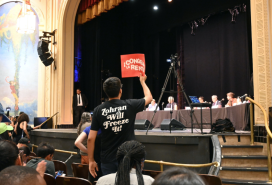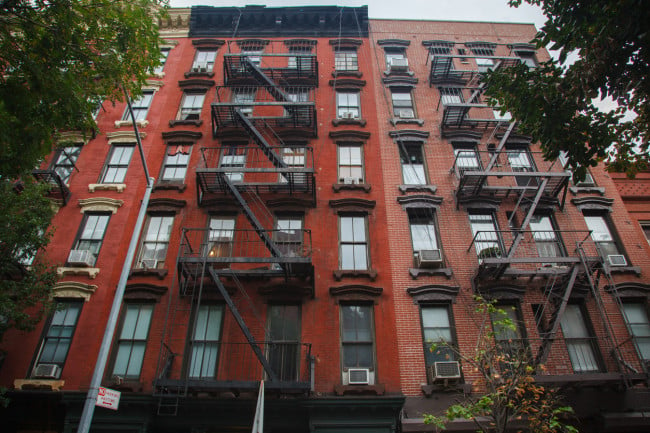Ask Altagracia: I'm a month-to-month tenant. My landlord keeps bothering me about leaving. What are my rights?
- Month-to-month tenants can face rent hikes and eviction at short notice
- Harassment is illegal and complaints can be filed through housing court

With a month-to-month tenancy, a landlord can raise the rent by any amount. You don’t have to accept it, but if you don’t, the landlord can end the tenancy.
iStock
I'm a month-to-month tenant. My landlord keeps bothering me and asking when I am going to leave. What are my rights?
As with most tenants’ rights issues, a good starting point is to figure out whether you are in a rent-regulated apartment or have protections under the Good Cause eviction law. Month-to-month tenancies do not give you the same security.
“If you let a market-rate lease expire and don’t seek a renewal from your landlord, you gain some flexibility, but sacrifice certain protections,” said Altagracia Pierre-Outerbridge, attorney and founder of Outerbridge Law representing residential tenants, condo owners, and landlords.
Under rent stabilization, you are entitled to automatic lease renewals and limited rent increases. For market-rate tenants, “Good Cause also protects renters from unreasonable increases and prevents evictions and non-renewals unless the landlord has a good reason,” Pierre-Outerbridge said.
However, with a month-to-month tenancy, landlords can raise the rent by whatever amount they choose. You don’t have to agree to the increase, but if you don’t, the landlord can simply terminate the tenancy. Depending on how long you’ve lived in the apartment you are entitled to a vacancy notice of 30, 60, or 90 days.
The other issue raised here is one of tenant harassment, which is illegal. This means your landlord cannot interfere with your use of the building as a means of getting you out of your apartment.
Figuring out your protections
If you are eligible for a rent-stabilized lease you can demand one from your landlord and if your request is refused, you can file a complaint with the New York State Division of Housing and Community Renewal (DHCR).
A rent-stabilized lease gives the highest protection against eviction but there are also tenant protections through the Good Cause eviction law. This law protects some market-rate tenants by limiting rent increases—to 8.82 percent currently—and preventing evictions and non-renewals unless the landlord has a good reason.
“Many tenants may not realize they are now subject to Good Cause eviction law,” Pierre-Outerbridge said.
Your protections under Good Cause mean the landlord needs to offer you a reasonable renewal and you would have to decline it before you could be evicted. An important caveat is that some apartments are exempt from Good Cause eviction law, notably small landlords.
Fighting tenant harassment
The harassment of tenants by any landlord is illegal. “If they’re creating construction noise to get you out or knocking on your door or refusing to make repairs, that could constitute tenant harassment,” Pierre-Outerbridge said.
If the landlord is failing to make repairs as part of their efforts to remove you, you can file a complaint with 311, the city’s non-urgent hotline, or via the Department of Housing Preservation & Development.
“Note that you have to give access if the landlord demands, reasonably, to make the repairs,” Pierre-Outerbridge said.
To fight harassment, you can file what’s known as a Housing Part or HP proceeding. The first step will be contacting your landlord in writing and then filing a petition with the housing court. You'll also need to gather evidence of the landlord’s behavior. This may include photographs or other documentation.
“If successful, you are entitled to recover fines from the landlord, who will receive an order to cease the harassment,” Pierre-Outerbridge said.
Once you have an order against the harassment, this constitutes your defense if your landlord seeks your eviction through housing court. It’s worth noting, there are also protections against retaliatory eviction.
“There’s a presumption that an eviction is retaliatory up to a year after a complaint is made,” Pierre-Outerbridge said. In these situations, the burden is on the landlord to prove the behavior wasn’t retaliatory.
Altagracia Pierre-Outerbridge, Esq. is the owner of Outerbridge Law P.C, focusing primarily on tenant representation. The firm represents all sides in landlord-tenant litigation and transactional matters such as month-to-month holdovers, nuisance cases, licensee cases, harassment claims, repair cases, tenant buyouts, succession claims, DHCR overcharges and rent reductions and more. Pierre-Outerbridge has 15 years of experience litigating in Supreme, DHCR, and Housing Court. To submit a question for this column, click here. To contact Outerbridge Law P.C. directly, call 212-364-5612 or 877-OUTERBRIDGE, or schedule a meeting today.




























